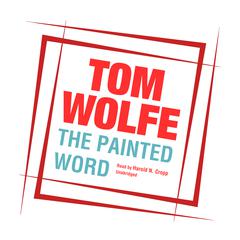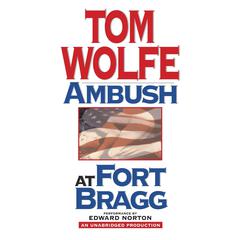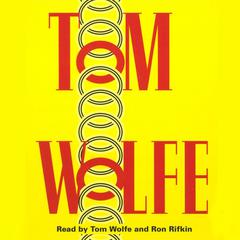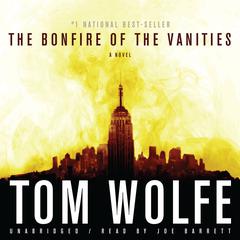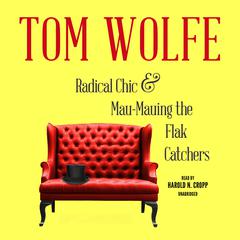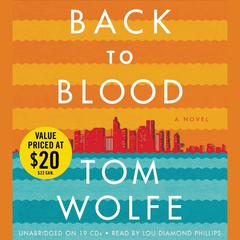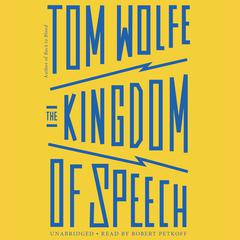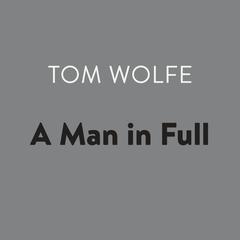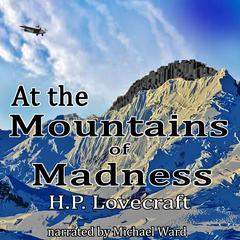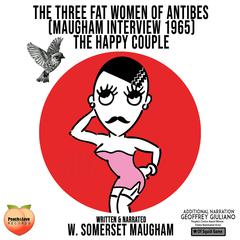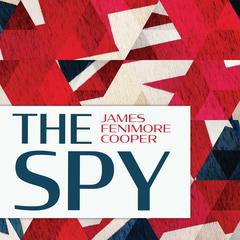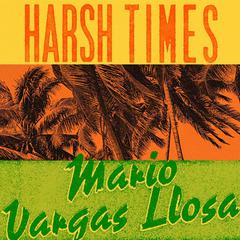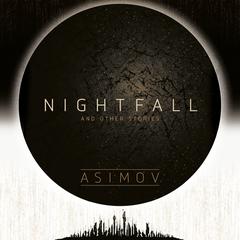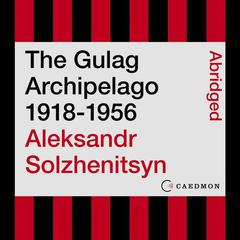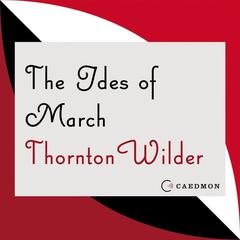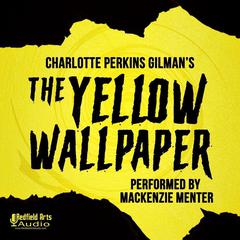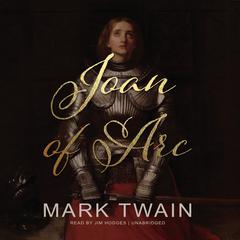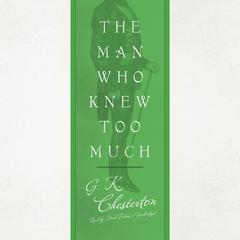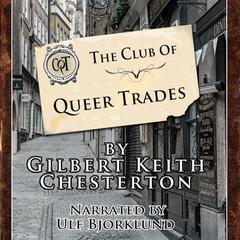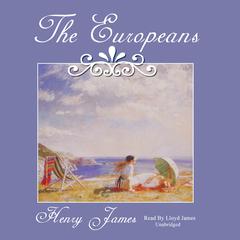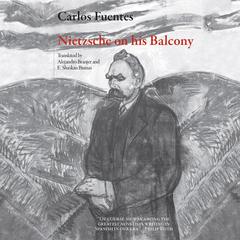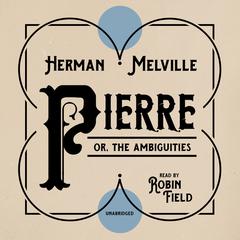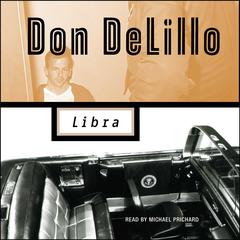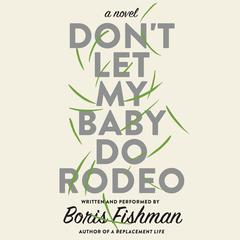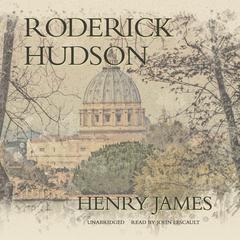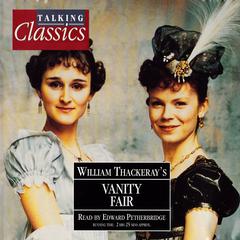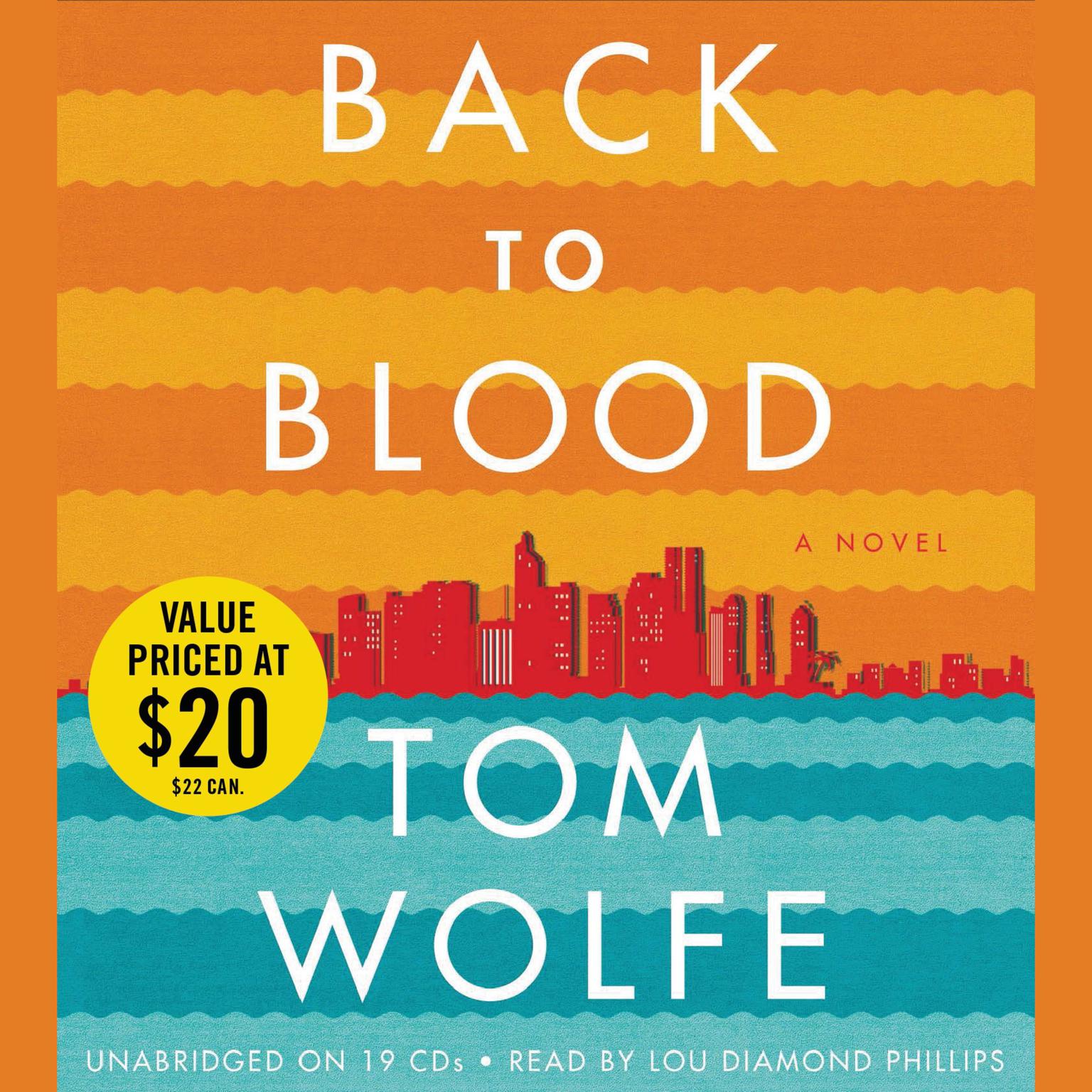 Play Audiobook Sample
Play Audiobook Sample
Back to Blood (Abridged): A Novel Audiobook
 Play Audiobook Sample
Play Audiobook Sample
Quick Stats About this Audiobook
Total Audiobook Chapters:
Longest Chapter Length:
Shortest Chapter Length:
Average Chapter Length:
Audiobooks by this Author:
Publisher Description
A big, panoramic story of the new America, as told by our master chronicler of the way we live now.
As a police launch speeds across Miami's Biscayne Bay -- with officer Nestor Camacho on board -- Tom Wolfe is off and running. Into the feverous landscape of the city, he introduces the Cuban mayor, the black police chief, a wanna-go-muckraking young journalist and his Yale-marinated editor; an Anglo sex-addiction psychiatrist and his Latina nurse by day, loin lock by night-until lately, the love of Nestor's life; a refined, and oh-so-light-skinned young woman from Haiti and her Creole-spouting, black-gang-banger-stylin' little brother; a billionaire porn addict, crack dealers in the 'hoods, "de-skilled" conceptual artists at the Miami Art Basel Fair, "spectators" at the annual Biscayne Bay regatta looking only for that night's orgy, yenta-heavy ex-New Yorkers at an "Active Adult" condo, and a nest of shady Russians.
Based on the same sort of detailed, on-scene, high-energy reporting that powered Tom Wolfe's previous bestselling novels, Back to Blood is another brilliant, spot-on, scrupulous, and often hilarious reckoning with our times.
Download and start listening now!
"I have now read all of Tom Wolfe's novels, which lends some perspective on the author and his work. On its merits "Back to Blood" serves as a commentary on culture, race relations, morality and the socio-political ramifications of the shifting demographics within the United States. The purpose in writing the book was to tackle the perplexing and divisive issue of immigration. Wolfe uses the city of Miami as not only the setting for his novel, but his characters are microcosms representing groups across the social stratosphere. The story as a whole provides insights into the author's take on the immigration issue as well as his broader perspectives on contemporary American society. The phrase "back to blood" serves as a rallying cry throughout the work that depicts America not as a traditional melting pot, but rather individuals explicitly identifying themselves through the lens of their sub-nationality, and the novel explores the barriers that impinge upon viewing Miami and America as a cohesive core nation. "Bonfire of the Vanities" was a glimpse into race relations, the culture of Wall Street greed, and socio-economic conflagration within the 80s, and "Back to Blood" returns to this familiar territory. In fact, it tackles many of the same themes. Wolfe provides a glimpse into race and the criminal justice system, but rather than emphasizing the consequences of racial inequality (Bonfire), Wolfe points to unjust outcomes that emerge from a society embracing hyper-sensitivity when it comes to race relations that in turn ensures unjust outcomes. In fact, at times, it seems as though Wolfe may have found the late Harvard Political Scientist Samuel Huntington's immigration thesis in his final work "Who Are We?" compelling. That would make sense because Wolfe is writing this book primarily at the height of the immigration debate between 2005-10 when Huntington's thesis was prevalent within elite circles. Another theme worth examining is the role of sex, throughout the story, sex correlates with status, power, and is even a tool for manipulation used interchangeably by both the ostensibly powerful (Sergei Korolyov, Dr. Norman Lewis), powerless (Magdalena), and the would be Master of the Universe (Maurice Fleichmann).Fortunately, Wolfe embraces many of the elements that made his second novel "A Man in Full" arguably his best. A protagonist faces existential upheaval all around, very similar to Voltaire's Dr. Panglossian in Candide, but finds inner strength within to not only withstand the onslaught, but mature as a character, and somehow master their environment within the turmoil of the world. This essentially Wolfean element was severely lacking in "I Am Charlotte Simmons" Wolfe's transgenderfied literary detour. A story that ends with Charlotte looking up in the stands into the disappointed face of the Princeton trained Professor Starling she at one time idolized. Realizing in that moment she had changed and conformed to the mediocrity surrounding her. The reader could only conclude that Charlotte's quintessential American journey that brought her to elite academia was in fact a moral regression, and departure from traditional notions of the American dream.So, where does that place "Back to Blood" within the Pantheon of the Wolfe universe, and likely his final complete work? Wolfe seems to care a bit more about the intrinsic moral worth of his characters within "Back to Blood". He reserves his greatest disdain for the elite class encumbered by pseudo-intellectuals (Dr. Norman Fisher), modern art enthusiasts, self-loathing Yale snobs/journalists (count Wolfe as one within this troupe), the political class, and solipsists masquerading as oligarchs. Well, again, this sounds much like "Bonfire of the Vanities", however, there is a modest twist. Wolfe finds nobility and true self-worth through the moral compass of his protagonist Nestor Comacho's journey to break away from the restraints and atavism of not only his own class, but the corruption surrounding him. He finds within himself a moral code based on traditional American values to define his own path towards maturity hence character development. In fact, the code is defined by Camacho by a TV program that he once saw on TV based on astronauts, much like "The Right Stuff", nevertheless, Wolfe would find good company with a fellow American literary elite from humble beginnings, T.S. Elliot in his memorable passage from the Wasteland, "We shall not cease from our exploration, but when our exploration ends, we shall return to the beginning, and know the place for the first time." So what does this mean for America's future, BACK TO BLOOD? Maybe."
— Shawn (4 out of 5 stars)
Quotes
-
“A soapy, gripping, and sometimes glib novel.”
— New York Times -
“Wolfe remains as skillful as ever in texturing the novel’s terrain, from the ‘prairie of concrete’ formed by Hialeah’s front yards to a tired retirement complex up in Broward County where ‘the little iron balconettes and the aluminum frames for the sliding doors looked as if they were about to fall off and die in a pile.”
— New York Times Book Review -
“This is a shrewd, riling, and exciting tale of a volatile, divisive, sun-seared city where ‘everybody hates everybody.’”
— Booklist (starred review) -
“Wolfe returns to fine form with this zingy, mile-a-minute novel of life in the weird confines of Miami…A welcome pleasure from an old master and the best from his pen in a long while.”
— Kirkus Reviews (starred review) -
“Actor Lou Diamond Phillips portrays Nestor Comacho, a man with both pride in his heritage and a thirst to be fully assimilated into America’s ever-changing culture. Ultimately, he performs a death-defying act that is perceived as heroic in the white community and as a betrayal in the Latin community. Phillips relishes the dramatic pauses and changes pace to match Nestor’s inner struggle and frustrations.”
— AudioFile -
“Wolfe creates his own Miami sound machine—noisy, chaotic, infused with tropical rhythms, and fueled by the American dream.”
— Publishers Weekly -
“Wolfe, Master of the New Journalism Universe, has done his homework and done it well.”
— Miami Herald -
“[Wolfe] has not lost his gift for panoramic presentation; Back to Blood surges with its large ensemble cast of Floridians and immigrants with mixed histories and conflicting agendas. This sun-bronzed band of sailors, crack dealers, art enthusiasts, porn addicts, insomniacs, and love-struck romantics keep the fiction bristling with meaning even as the action moves forward.”
— Barnes & Noble, editorial review -
“Actor Lou Diamond Phillips does full justice to Wolfe’s sprawling, multicharacter novel of present day Miami, with its amazing mixture of ethnicities and cultures. He can handle Cubans, African Americans, Russians, Haitians, and even elderly retired New Yorkers with ease and authority.”
— SoundCommentary.com -
“Back to Blood is a return to form, a work that solidifies Wolfe’s stature as one of the best. Using his incisive journalistic skills, his flair for the cinematic moment, and his laugh-out-loud sense of humor, Wolfe takes the disparate types in and around Miami to create a tapestry of memorable scenes and characters. The result is entertaining, revealing, and perhaps even bigger than the sum of its parts. This is a book that will do for Miami what Wolfe’s mega-hit The Bonfire of the Vanities did for New York.”
— Amazon.com, editorial review -
Bonfire of the Vanities (1987):
-
A big, bitter, funny, craftily plotted book that grabs you by the lapels and won't let go.
— New York Times Book Review -
A superb human comedy and the first novel ever to get contemporary New York, in all its arrogance and shame and heterogeneity and insularity, exactly right.
— Washington Post Book World -
A Man in Full (1998):
-
The novel contains passages as powerful and as beautiful as anything written--not merely by contemporary American novelists but by any American novelist....The book is as funny as anything Wolfe has ever written; at the same time it is also deeply, strangely affecting.
— New York Times Book Review -
I Am Charlotte Simmons (2004):
-
Wolfe is one of the greatest literary stylists and social observers of our much observed postmodern era....A rich, wise, absorbing, and irresistible novel.
— Lev Grossman, Time -
Wolfe's dialogue is some of the finest in literature, not just fast but deep. He hears the cacophony of our modern lives.
— Los Angeles Times -
Brilliant...I couldn't stop reading it....Tom Wolfe can make words dance and sing and perform circus tricks, he can make the reader sigh with pleasure.
— Michael Dirda, Washington Post
Awards
-
A New York Times bestseller
-
An Amazon Best Book of the Month, October 2012
-
An Amazon Top 10 Book, October 2012
-
A USA Today bestseller
-
A Kirkus Reviews “New and Notable Title”, October 2012
-
A Los Angeles Times bestseller
-
SoundCommentary.com’s The Best of the Best, 2013
Back to Blood Listener Reviews
-
" Not my favorite Tom Wolfe book, but still an entertaining read "
— Pamela, 2/16/2014 -
" Quick read - a little bit of a guilty pleasure but the characters felt too cartoonish to really get attached. "
— Skrutzsch, 1/20/2014 -
" Forcing myself to finish. "
— Heather, 1/14/2014 -
" Tom Wolfe is still in top form and his exploration of the diversity and socio economic classes of Miami is just as poignant and possibly rivals his depiction of New York in 'The Bonfire of the Vanities' and Atlanta in 'A Man in Full.' "
— Patty, 1/5/2014 -
" This is the first Tom Wolfe book I have read, and maybe this wasn't the greatest way for me to start reading Wolfe. This book was painfully hard for me to get into and even to finish. His writing style has no flow for me, and is very frustrating with all the emotions typed in the middle of sentences and what not. Just not my style of writer and the plot was very disappointing as well. The ending didn't really wrap up anything so my only hope is that he comes back to these characters again, but he probably won't. "
— Shelby, 1/4/2014 -
" interesting narrative about the melting pot that refuses to melt in Miami. I love Wolfe and his style and have read everything he has written but although I did enjoy things one as well, it was my least favorite of his work. Didn't have the same kinetic energy as usual "
— Carol, 12/26/2013 -
" I read this on flights to and from Miami. It's Bonfire in Miami with more likable characters. Very good though, didn't try to wrap everything in a cute little bow like Man in Full. Easy 4 stars. "
— Greg, 12/9/2013 -
" Another great Tom Wolfe book. "
— Katie, 12/8/2013 -
" A rather rambling story of Cubans in Miami and mixed race relationships. Some very unlikely scenarios that coincide yet make no sense in coming together. Characters not fully developed. Very disappointing for a Tom Wolfe book. "
— Stephanie, 11/21/2013 -
" good but far from his best ...a pastiche of material "
— Gmastalli, 11/6/2013 -
" Tom Wolfe comes pretty close with this, but just misses the sweet spot. Still, it's superior to most contemporary fiction. Miami feels oppressive and the racial tension/animosity is palpable. The elite whites are a bit over the top, caricatures, but this is what Tom Wolfe does. "
— Alex, 10/25/2013 -
" Man in Full much better. "
— Cynthiajsnyder, 9/29/2013 -
" Fun writing! Snark for everyone! Enthusiastic writing! But ultimately I just couldn't get attached to any person! "
— Lori, 9/6/2013 -
" I suppose Wolfe has a lost a step or two ( to use a sports phrase) and this story lacks the bite of Bonfire but it's a breezy read. Have to ask someone else if he "got" Miami. "
— Saint, 7/14/2013 -
" I usually enjoy Tom Wolfe's books, but I couldn't get into this one. The way he phrases things and plays with language seemed to become much more important than the story itself. Since I read for story, I decided to pass on finishing this opus. "
— Harriet, 7/11/2013 -
" Plot kind of weak (too many coincidences, over-reactions, loose ends) and way too long. But, Tom Wolfe is always fun to read. "
— Foolbuddy, 6/29/2013 -
" Tom Wolfe channeling Hunter Thompson, Oscar Wilde, and Allen Ginsberg. Delightful. "
— Raining, 5/19/2013 -
" okay, in fairness, I didn't read it all. Love Tom Wolfe, but after a few chapters was feeling seasick or America sick or something and had to stop as I love America. "
— Rachael, 4/21/2013 -
" I had to bail halfway through. This is just an awful showing from one of my favorite living authors. "
— Cooper, 2/11/2013 -
" This got a It repetitive and long. My daughter listen to it on tape and thoroughly enjoyed it. I think it might be better listen then read. It was classic Tom Wolfe. "
— Janet, 2/1/2013 -
" My least favorite wolfe. Waste of time "
— David, 12/26/2012 -
" Either I've outgrown Tom Wolfe or his brand of cultural critique died in the 80s. Or both. This felt like a Bonfire redux told through the pedantic lens of an old, privileged (racist, misogynist) white man. I wonder if a re-reading of Bonfire would feel the same? In any case, not worth the read... "
— Craig, 11/12/2012
About Tom Wolfe
Tom Wolfe (1931–2018) was the author of numerous books considered contemporary classics, including The Electric Kool-Aid Acid Test, The Right Stuff, and The Bonfire of the Vanities, among others, and several of his books have been made into major motion pictures. He was also a journalist and founder of the New Journalism movement of the 1960s and 1970s. He is credited with introducing such terms as “the right stuff,” “radical chic,” “the Me Decade,” and “good ol’ boy” into the English lexicon. A native of Richmond, he earned his BA degree at Washington and Lee University and a PhD in American studies at Yale.
About Lou Diamond Phillips
Lou Diamond Phillips is an accomplished actor with numerous film, television, and theater credits. Among his films are La Bamba, Young Guns, and Young Guns II.




